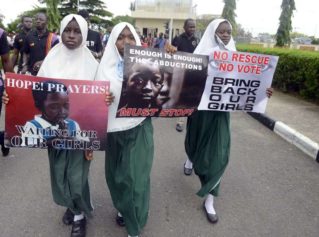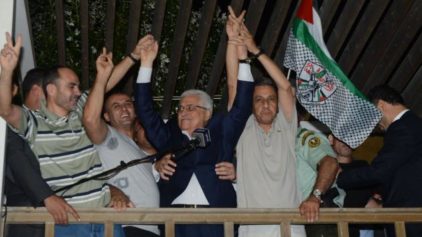While the ceasefire in Gaza and Israel appears to be holding up, the killing of a Palestinian man by Israeli troops at the border highlights the untenable imprisonment of Gazans in their territory.
The Palestinian man was killed and 19 other Palestinians were injured because they got too close to the border fence that separates Gaza from Israel. In effect, the soldier was acting as a prison guard, lashing out at the inmates for venturing near the fence that delineates their imprisonment.
While Palestinians are undoubtedly outraged by the killing, most observers don’t expect Hamas to retaliate by sending more rockets into Israel because that would jeopardize the gains that Hamas appears to have made in the ceasefire. Nafez Azzam, a spokesman for Gaza’s Islamic Jihad, said the shooting was a violation of the truce, but the Gaza prime minister, Ismail Haniyeh of Hamas, has urged Palestinians in Gaza to respect the ceasefire.
The eight days of fighting killed 166 Palestinians, including dozens of civilians, and six Israelis.
Hamas is currently riding high, its stature now appearing to eclipse that of the Palestinian Authority based in the West Bank, the longtime leader of the Palestinian movement until the more militant Hamas rose to power. One of the main issues Hamas will now be able to negotiate with Israel is the possible opening of the border fence to allow Gazans to be able to travel into Israel, which is currently restricted.
With Israel and Egypt severely restricting the movement of both people and goods into and out of Gaza on both sides, Gazans rightly feel imprisoned, without adequate food and healthcare and very little employment and activities for their young men—which is a quick way of radicalizing them. After the 2008 campaign in which Israel killed 1,400 Gazans and reduced much of the region to rubble, Palestinians weren’t even allowed to bring enough materials into Gaza to rebuild. It is holding these angry young men in check that will be the key to any truce. When Gazans have been allowed to cross the borders in past years, only men under 18 and over 60 were allowed to move freely.
According to a report by an Associated Press Television News cameraman, earlier today hundreds of Palestinians approached Israel’s border fence in several locations in southern Gaza. In the view of Israel, this is a no-no: In the past when Palestinians have gotten too close to the fence, soldiers have routinely opened fire to enforce the no-go zone meant to prevent infiltrations into Israel.
But since the ceasefire, more Gazans have been challenging the no-go zone. The Associated Press captured one incident on video, which had several dozen Palestinians, most of them young men, approaching the fence near a group of Israeli soldiers standing on the other side.
According to the AP, the video showed some of the Palestinians briefly talking to the soldiers, while others appeared to be taunting them with chants of “God is Great” and “Morsi, Morsi,” in reference to Egyptian President Mohammed Morsi, whose mediation efforts helped bring about the truce.
When one of the soldiers shouted in Hebrew, “Go there, before I shoot you,” and pointed away from the fence, toward Gaza, the soldier dropped to one knee in a firing position. Eventually, a burst of automatic fire could be heard—though it wasn’t clear if the casualties were from this incident.
According to Gaza health official Ashraf al-Kidra, a 20-year-old man was killed and 19 people were wounded.
As the symbol of their horrid conditions, the fence serves as a taunt to Palestinians—as evidenced by the report from Israeli military that roughly 300 Palestinians approached the security fence at several locations in southern Gaza and tried to damage it and cross into Israel. The military said soldiers fired warning shots in the air to distance the Palestinians from the fence, but after they refused to move back, troops fired at their legs. It also said a Palestinian infiltrated into Israel in the course of the unrest, but he was returned to Gaza.
Any sense of ease that Israelis felt about the ceasefire was shaken yesterday when an Israeli Arab planted a bomb on a bus in Tel Aviv that wounded 27 people, police said. According to police spokesman Micky Rosenfeld, the man, from the village of Taybeh in Israel was connected to the Hamas and Islamic Jihad militant groups.
The National Post reports that attacks by Israeli Arabs are rare, though they have happened in the past.
The border issues are a primary topic in the talks in Cairo between Israeli and Hamas envoys. Hamas demands lifting all border restrictions, while Israel insists that Hamas must halt weapons smuggling to the territory.
In Israel, a poll showed that about half of Israelis think their government should have continued its military offensive against Hamas.
The independent Maagar Mohot poll released Friday shows 49 per cent of respondents feel Israel should have kept going after squads that fire rockets into Israel. Thirty-one per cent supported the government’s decision to stop. Twenty per cent had no opinion. Twenty-nine per cent thought Israel should have sent ground troops to invade Gaza. The poll of 503 respondents had an error margin of 4.5 percentage points.
The schism between Hamas and the Palestinian Authority serves to weaken the negotiating power of the Palestinians when they can ill afford it. While the Palestinian Authority is seen as more moderate, Hamas, an Islamist movement, does not recognize Israel’s right to exist and has been branded a terrorist organization by the United States, European Union and Israel. It won legislative elections in 2006 and wrested control of Gaza from Fatah in 2007, effectively ruling the territory on its own.
Hamas is even opposed to the move by Palestinian Authority President Mahmoud Abbas to be considered an “observer” state by the UN, which would be a huge blow to Israel.
“The Palestinian national movement looks like Noah’s Ark right now. There are two of everything—two constitutions, two presidents, two security services, two mini-states,” Middle East analyst Aaron David Miller told CNN. But after the most recent battle with Israel, “It is Hamas’s stock that is rising,” he said.
While Israel and the United States refuse to deal with Hamas, Daniel Ayalon, Israel’s deputy foreign minister, told CNN late Wednesday that Israel would be “very happy to talk to Hamas” as long as it renounces terrorism and recognizes Israel’s right to exist.
But Rashid Khalidi, a Columbia University professor of Middle Eastern history and a one-time adviser to the Palestine Liberation Organization, said Israel’s continued expansion of settlements in the West Bank “has made the Palestinian Authority look weak, feeble, unable to advance the Palestinian cause.”
“Most Palestinians are sick to death of this split,” Khalidi told CNN. “They understand that they are the weaker party, and that the split weakens them further.” He said the Palestinians need to unite to negotiate with Israel, and both Israel and the United States need to drop the “fiction” that they won’t negotiate with Hamas.
“The world is dealing with Hamas,” he said. “The secretary of state is going to go to Cairo, and she’s going to talk to the Egyptians and they will talk to Hamas. Israel is dealing with Hamas.”


